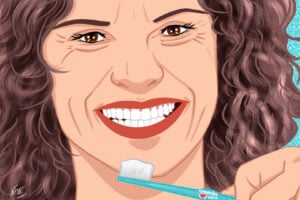The Ageless Smile: How To Keep It Sparkling
As we grow older, our once-sparkling smile starts dimming slowly but surely. A lifetime of crunching wears away the outer layer of enamel and flattens the biting edges. Tooth surfaces are also affected by menopause and the exposure to acidic foods (such as citrus fruits) and get stained by coffee, tea, red wine, and tobacco. So, what options could we have to make our teeth look fresher again? There are plenty of ways to ensure a lovely smile. From natural DIY techniques to fluoride toothpaste, there’s no shortage of whitening products these days. However, before deciding on a bleaching method, it’s a good idea to talk to a dentist.
Beware of ‘health trends’
Homemade remedies such as rubbing a banana peel on your teeth, to brushing with a mixture of lemon juice and bicarbonate of soda, simply don’t work. Many contain acids, sugars and powerful abrasives, which may lead to tooth damage and poorer dental health if used routinely. On the other hand, prolonged use of home whitening products may weaken the surface of the enamel.
Recently, there have been claims that one should use charcoal toothpaste to brighten your smile – Anna Middleton, leading and award-winning dental hygienist and founder of London Hygienist said- but there has been no evidence to prove its effectiveness in tooth-whitening. While it may lift light surface staining, the truth is, most so-called whitening toothpaste can be abrasive and damage the enamel. Charcoal may even contribute to negative aesthetic effects, as the particles can become embedded in cracks in the enamel or restoration margins. In essence, there is no nutritional evidence for any of those trends advertised online, and many are causing significantly more harm than good. I don’t know about you, but I’d rather get my medical information from a trained professional and not someone pretending to be a pro just because they have 10,000 Instagram followers.
Professional teeth whitening
Nowadays, teeth whitening is offered by dentists, other dental practitioners and by cosmetic businesses on the high street. Many teeth-whitening products, containing hydrogen peroxide, are also available over the counter for home application, including gels and strips. So which option is the safest? The researchers suggest home systems should be always used under the supervision of a dentist. If you are thinking about brightening your smile, it’s better to consider one of the following professional treatments.
Whitening trays
Dental professionals dispense custom-made moulds that have been created just for you and therefore fit in your mouth and directly over your teeth perfectly. Some teeth whitening trays are pre-filled with the appropriate amount of a peroxide-based whitening gel, while others come with syringes that can be dispensed as needed by the user. Either way, teeth whitening trays usually require a longer daily application time than many whitening options. Some are used for hours at a time, while others recommend the overnight application, during which time you should not eat or drink.
Veneers
It’s a dental procedure in which a tooth-coloured resin material is applied to teeth to restore or improve a person’s smile. Veneers are like false fingernails that are custom made to fit directly over your teeth: ultra-thin sheets of laminated porcelain or an alternative ceramic material. They recreate the natural look of teeth while also providing strength and resilience comparable to natural tooth enamel, directly over your teeth. With veneers, we can create your dream smile and make sure you feel confident every time your teeth are in the spotlight.
Cosmetic Bonding
Dental bonding is a single-session treatment capable of producing incredible results. This procedure, also known as composite, is an ideal option for anyone who has minor aesthetic flaws, such as small gaps between the teeth, chips or worn edges. Using a material called dental composite, your dentist can alter the shape of the tooth. This material, which is designed to match the shade of your natural teeth, can be manipulated and moulded to fill gaps, build up worn surfaces and balance the aesthetic of the smile. Once the composite has been applied, it is set using a curing light. Any final adjustments are made once the composite is firm and then you can see your new smile.
Good oral health routine at home
In the end, keeping your mouth young requires diligent do-it-yourself care: brushing with fluoride toothpaste, flossing at least twice a day, as well as visiting your dentist and hygienist regularly. Most of all, don’t underestimate the power of fluoride.
For Mayur N Pandya, Dentist and Chief Clinical Officer of Together Dental: “Maintaining healthy teeth, mouth and gums help avoid future dental treatments. Keeping your oral health routine during this ‘stay- at- home’ time, and creating positive habits can also help maintain a more positive mindset.”
Here are his top tips for an ageless smile:
- Moderate your diet
Of course, what you eat has a massive effect on your teeth. You should increase the number of vegetables which contain healthy fibre. You should reduce the frequency of consumption of sugary and acidic foods and drinks. Sugar is converted into acid in the mouth which can then dissolve the enamel of your teeth. Acidic fruits, fruit teas and fizzy drinks can also erode tooth enamel so enjoy these things only in moderation. - Don’t go to bed without brushing your teeth
Brushing before bed leaves your mouth clean overnight when your mouth becomes drier, and bacteria begin to multiply. By removing the plaque that has accumulated throughout the day, you can reduce your risk of gum disease and dental decay. Plaque is a biofilm of bacteria that coats the surfaces of your teeth. - Brush-up on your brushing technique
Brush your teeth with fluoride toothpaste twice a day, when you get up and before you go to bed, for two minutes to help keep your teeth and mouth healthy. At night time, try not to rinse after brushing to leave a reservoir of fluoride which will help to re-mineralise tooth enamel and prevent cavities. - Slow down!
Most people brush their teeth in a hurry. To do a good job of cleaning your teeth it is important not to rush it. Work slowly in soft, gentle, circular motions, taking your time and moving the toothbrush to remove plaque. Any unremoved plaque can eventually harden, leading to tartar build-up and the beginnings of gum disease. - Go electric
It doesn’t matter whether you use an electric or manual toothbrush, they are both equally as good, as long as you brush ALL the surfaces of ALL of your teeth and gently angle the bristles towards the gumline. That said, electric toothbrushes do take the effort out of brushing, allowing you to focus on your technique. - Fluoride, fluoride, fluoride
Use fluoride toothpaste. Adults should use a toothpaste that contains at least 1,450 parts per million (ppm) fluoride. At night time, try not to rinse after brushing to leave a reservoir of fluoride which will help to remineralise tooth enamel and prevent cavities. During the day, after meals, use an alcohol-free fluoride mouthwash to keep your enamel strong. - Floss
Flossing isn’t just for getting those little bits of food that are stuck in between your teeth. It is much more about reducing plaque in between teeth, the gum line and helping to lower any gum inflammation in your mouth. Flossing once a day is usually enough to make a big difference to gum health. - Stop Smoking and Moderate your Alcohol intake
Smoking is not just bad for our general health but puts us at risk of oral cancer. Around 90% of mouth cancers can be linked to preventable lifestyle factors such as smoking and excessive alcohol consumption. Smoking and drinking together increase the risk of mouth cancer by up to 30 times. Use this time at home to stop smoking and moderate your alcohol consumption.
As well as helping you establish a routine, having a fresh mouth and beautifully clean teeth will make you feel better and prevent future dental problems.
Like this article? Sign up to our newsletter to get more articles like this delivered straight to your inbox.



